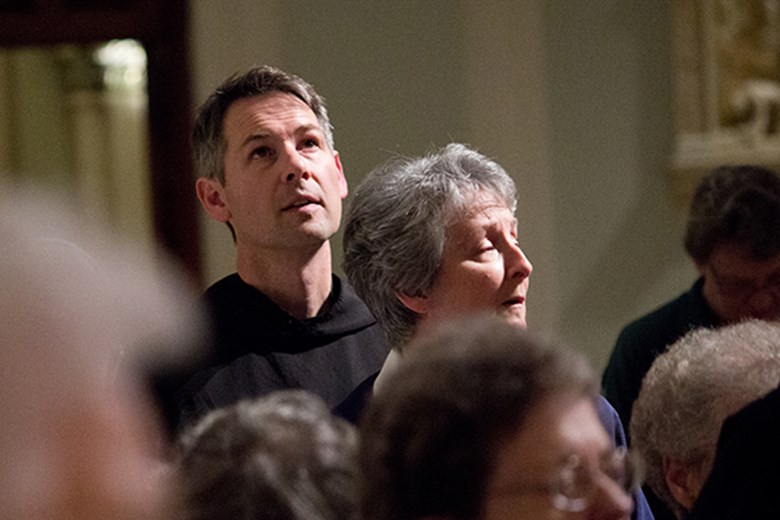Preferring Nothing to the Work of God
Fr. Adrian Burke, OSB
Thursday, July 14, 2022

"Indeed, nothing is to be preferred to the Work of God."
Rule of St. Benedict, Chapter 43
When I entered the Seminary here at Saint Meinrad to study for the priesthood for the Archdiocese of Indianapolis (before I knew anything at all about the monastic community), I remember being deeply moved the first time I attended Vespers in the Archabbey Church.
I was a musician throughout most of my formal schooling, and I have appreciated music practically from birth, but the exquisite sound emitted from the monastic choir as the monks gently, carefully, pitched the words of the psalms according to the now-familiar chant modes introduced by our Father Columba back in the '70s, while being gently supported by a discreet organ accompaniment, was like nothing I'd ever heard before. The experience was supernatural and it sent chills down my back; I was smitten!
Many men who come to Saint Meinrad to try their vocations as monks admit that it was their love for the liturgy that first hooked them into considering a vocation as a monk in the first place. The quotation from the Rule at the beginning is made much of by us monks, and it serves to remind me that my love for the liturgy, the reason for my initial attraction to the monastery, ought to remain an important reason, if not the only one, that I stay.
Benedictines, as a rule, love the liturgy - and I would certainly count it as one of our principal values, particularly here at Saint Meinrad, which has a certain reputation for the high quality of our liturgy. This isn't something we can take for granted, though. Since our praise of God five times each day - at vigils, lauds (morning), sext (midday), vespers and compline - serves as a structure that punctuates each and every monastic day, giving it a certain rhythm, it risks all too easily becoming routine.
Not only that, the praise of God in our monastic church is a work that doesn't belong to us. It is the work of Christ who is praising his Father through this community united as his body in the Spirit. By together lifting our voices in praise of God, we serve as Christ's body lifting up in sonorous chant his praise that rises "as incense in God's sight." (Psalm 141.2)
This is why nothing may be preferred to this work. Monks strive "to love Christ before all else" (RB 4.21), and in this important way we demonstrate a distinctly different prioritizing of things. If we're to remain faithful to our vocation as Christians and as monks, whose "ways of acting should be different from the world's ways" (RB 4.20), we must surrender all our powers to Christ and render ourselves available for use as part of his continued bodily presence in the world.
And, since the prayer of the community is, first of all, the prayer of its head, Jesus Christ, by placing the "work of God" first on our individual and collective lists of priorities, we are loving Christ before all else. We render ourselves available to Christ so he can continue to voice his praise to God our Father by means of our earthly existence, our fleshly bodies, our voices praising God five times each day in our abbey church. This is the primum officium, the first duty or service, of the monk.